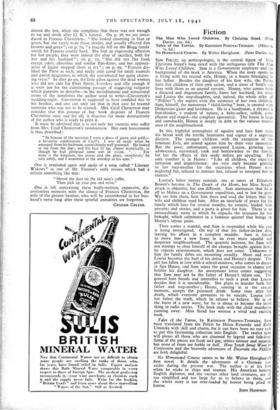Fiction
The Man Who Loved Children. By Christina Stead. (Peter Davies. los. 6d.)
No Homeward Course. By Walter Havighurst. (Peter Davies. Is.)
SAM POLLIT, an anthropologist, is the central figure of Miss Christina Stead's long novel with the ambiguous title The Mx, Who Loved Children. Sam is a Government employee and the background of the book is America. When the story opens he is living with his second wife, Henny, in a house belonging to her father. Besides the daughter of his first wife, the Pollits have five children of their own union, and a sister of Sam's also lives with them as an unpaid servant. Henny, who comes from a decayed and degenerate family, hates her husband, his sister and Louisa the step-daughter -and, indeed, the whole tribe of " Pollitry "; she regrets even ihe existence of her own children. Sam, himself, the monstrous " child-loving " bore, is created with Dickensian gusto and lavishness. He is a handyman, a rhymer, a free-thinker, a student of nature, a baby-talker, selfish, com- placent and stupid—the complete egocentric. The house is large and ramshackle, Henny is deeply in debt to the various trades. men of the neighbourhood.
In this frightful atmosphere of squalor and hate Sam rules his brood with the terrific heartiness and vigour of a supreme dictator. The younger children. with the exception of the feminine Evie, are armed against him by their very innocence. But the poor, unfortunate, unwanted Louisa, growing into adolescence, nursemaid, cook and bottlewasher to the family, for her the effects of this seedy milieu are appalling. Her only comfort is in Henny : " Like all children, she expected intrusion and impertinence : she very early became grateful to her step-mother for the occasions when Henny most neglected her, refused to instruct her, refused to interpret her to visitors."
Louisa's bitter history reminds one at times of Elizabeth Bowen's heroine in The Death of the Heart, but Miss Stead's attack is objective, her aim different. Sam announces that he is off to Malaya on a Government expedition, and at last he goes. We see him there, hear him there and read the letters that his wife and children send him. After an interlude of peace for his family which lasts for several months, he returns, loaded with presents and stories, and a party is given for him. There is an extraordinary scene in which he unpacks the treasures he has brought, which culminates in a fantastic quarrel that brings on Henny's labour pains.
Then comes a scandal, and Sam is suspended while his case is being investigated. On top of that his father-in-law dies, leaving his affairs in a complete muddle. Sam is forced to move into a new home in an even more squalid and desperate neighbourhood. The quarrels increase, for Sam will not attempt to clear himself of the charges brought against him; he expects reinstatement, which does not come. Unknown to him the family debts are mounting steadily. More and more Louisa becomes the butt of his defeat and Henny's despair. The girl has fallen in love with a school-mistress, who comes to dinner at Spa House, and Sam seizes the great occasion to shame and belittle his daughter. An anonymous letter comes suggesting that Sam may not be the father of Henny's infant son. The general .hate breeds and intensifies to such a peak that Louisa decides that it is unendurable. She plans to murder both her father and step-mother ; Henny, coming in at the crucial moment, accepts the poisoned drink. Some time after her death, which everyone presumes to be suicide, Louisa tells her father the truth, which he refuses to believe. He is on the burst of a new wave, for he is about to become the latest thing in radio uncles. The book ends with the child murderess running away. Miss Stead has written a vivid and exciting book.
Tales of the Tetras by Karimierz Przerwa-Tetmajer, have been translated from ;he Polish by Helen Kennedy and Zofia Uminska with skill and charm, for it can have been no easy task to put this fascinating collection into English. The twelve tales will please all those who are charmed by legend and folk-lore. Some of the pieces are fresh and gay, others sinister-and strange, but none of them are feeble or dull. How joule Smas Went to Confession and the heavenly adventure of Zwyrtala the Fiddler are both delightful.
No Homeward Course seems to be Mr. Walter Havighurst's first novel. It details the adventures of a German SO' raider during the present war. The author is at his best when he sticks to ships and seamen. His American heiress, English diplomat, and the various other land creatures, are all too simplified and too large for us to believe in them, and the whole story is too over-loaded by horror being piled on horror.
JOHN HAMPSON.

























 Previous page
Previous page